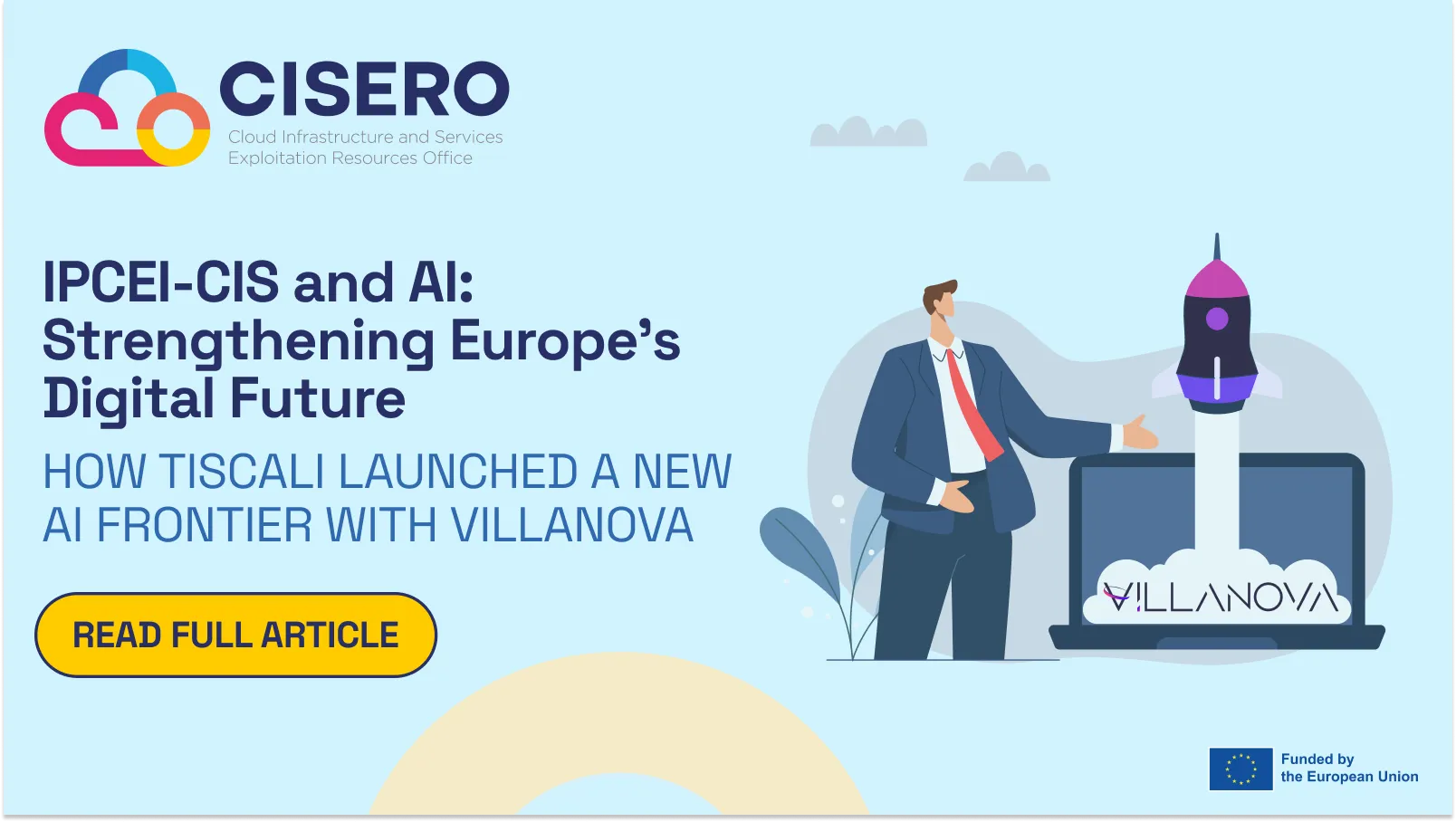IPCEI-CIS and AI: Strengthening Europe’s Digital Future
7, May, 2025

The Important Project of Common European Interest on Next Generation Cloud Infrastructure and Services (IPCEI-CIS) represents a cornerstone in Europe's ambition to achieve digital sovereignty. Central to this initiative is the advancement of artificial intelligence (AI) and the development of decentralised digital infrastructure. AI plays a dual role within IPCEI-CIS: both as a technology that demands increasingly sophisticated compute capabilities and as a transformative force that enhances the functionality of cloud and edge systems.
IPCEI-CIS seeks to counterbalance the current dominance of extra-european hyperscalers—Google, AWS, Microsoft Azure, and Oracle—by funding European-led cloud and edge infrastructure projects. These efforts aim to create competitive, sustainable, and secure digital ecosystems that reflect European values. Projects funded under IPCEI-CIS, such as SAP’s Open Reference Architecture and Orange’s open source telco cloud stack, underscore the strategic importance of AI in building modular, interoperable, and sovereign infrastructures.
Moreover, the emphasis on AI is not merely technological—it is deeply tied to economic inclusion and sustainability. AI workloads are resource-intensive and often inaccessible to small and medium-sized enterprises (SMEs) without significant investment in infrastructure. IPCEI-CIS addresses this gap by promoting AI solutions that are both environmentally conscious and accessible. For instance, E-Group Software’s FedEU.ai project aims to separate data processing from insight generation, reducing the carbon footprint of AI while enhancing data security.
As cloud and edge computing converge, AI’s potential is amplified. The edge-cloud model, where real-time AI inferencing occurs at the edge and training is conducted in the cloud, offers cost and energy efficiencies. Through IPCEI-CIS, Europe is actively investing in this paradigm, laying the groundwork for a robust and sovereign digital ecosystem that serves a broad spectrum of users, including SMEs.
Experts reaffirmed that businesses incorporating AI into their core operations are gaining a clear competitive advantage at a recent regional conference organised by Infobip and the SLO CRO Chamber of Commerce. As AI moves from pilot testing to practical use, especially in SMEs, presenters emphasised that long-term competitiveness depends on strategic execution rather than merely technological preparedness. This aligns with IPCEI-CIS's focus on providing European businesses with affordable and sustainable AI infrastructure, guaranteeing that innovation is shared throughout the business ecosystem rather than just IT giants.
Tiscali and the Villanova Project: A New AI Frontier for Europe
One of the most promising examples of AI-focused innovation within IPCEI-CIS is the Villanova Project, spearheaded by Tiscali Italia, a subsidiary of the Tessellis group. In partnership with Expert.ai—a leading company in natural language AI—Tiscali has set in motion the establishment of a dedicated entity (NewCo) that will carry forward the development of Villanova.
The project was selected by the European Commission and the Italian Ministry of Enterprises and Made in Italy as a key contributor to the development of multimodal generative AI within a European framework. Its primary ambition is to help create a European value chain for next-generation cloud services and generative AI infrastructure. By focusing on European languages and an open source interface, the Villanova Project seeks to democratise access to generative AI tools, particularly for smaller businesses with limited technical resources.
This strategic move is further strengthened by Expert.ai’s anticipated 40% (or more) equity stake in the NewCo, ensuring the injection of both technical expertise and capital. The agreement includes future options for both companies to realign ownership depending on evolving strategic interests. According to Tiscali’s CEO, Davide Rota, the partnership will ensure the Villanova Project becomes a "Made in Europe" competitive success, backed by strong AI know-how and industrial resources.
In short, the Villanova Project exemplifies how IPCEI-CIS is fostering innovation ecosystems in which AI technologies are developed by and for European companies, enabling them to compete globally while reinforcing Europe’s digital sovereignty.
CISERO: Connecting Strategies for Sovereign Infrastructure
While individual projects like Villanova highlight the tangible outcomes of IPCEI-CIS, initiatives such as CISERO provide the strategic coordination necessary for long-term success. CISERO’s role is to ensure alignment between technical development and Europe’s broader policy objectives. By facilitating collaboration across member states and industry stakeholders, CISERO helps shape the roadmaps that guide investment and innovation in sovereign cloud and edge technologies.
This has been showcased again at the Annual IPCEI-CIS Meeting—hosted at Gdańsk University of Technology— where CISERO played a major role in discussions on progress, collaboration, and strategy. This event, part of the wider 8ra Initiative, reinforced the vision of a resilient and future-proof digital infrastructure built on collaboration, openness, and shared values. As IPCEI-CIS continues to drive Europe toward a more independent and secure digital future, CISERO ensures that these efforts remain coordinated, effective, and market-relevant.
By linking groundbreaking projects like Villanova with strategic guidance from CISERO, the IPCEI-CIS framework is positioning Europe not just as a user of digital technology, but as a global leader in its development and governance.
Subscribe to our Newsletter here to stay updated on all the latest developments in the IPCEI-CIS Community.